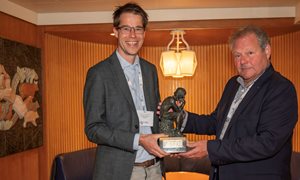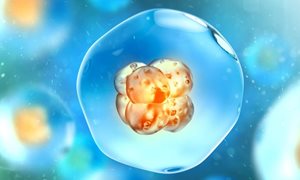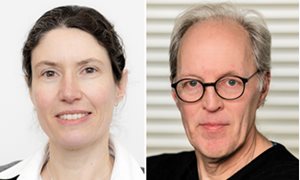30 March 2020
The T cells of the adaptive immune system are constantly on the move, can enter most tissues, and operate inlarge crowds. Millions of densely packed T cells roam the lymphatic organs in search of foreign antigen while activated T cells divide vigorously and flock to tissues where they mount local immune responses to pathogens or cancer cells.
The HFSP project combines expertise in immunology, computational biology, and pedestrian dynamics to shed light how T cell crowds remain motile with such remarkable efficiency in many conditions and what it would take to disrupt their smooth flow
HFSP grants are highly competitive awards intended for basic research at the frontier of human knowledge. They are open to applicants from all nations, and awardees are selected through a rigorous year-long review process. From more than 700 proposals that were initially submitted by scientists based in more than 50 different countries, only the top 4% were funded, and Johannes Textor's propasal was ranked third overall. Johannes Textor was the only scientist from a Dutch instutition to be selected.

The T cells of the adaptive immune system are constantly on the move, can enter most tissues, and operate inlarge crowds. Millions of densely packed T cells roam the lymphatic organs in search of foreign antigen while activated T cells divide vigorously and flock to tissues where they mount local immune responses to pathogens or cancer cells.
The HFSP project combines expertise in immunology, computational biology, and pedestrian dynamics to shed light how T cell crowds remain motile with such remarkable efficiency in many conditions and what it would take to disrupt their smooth flow
HFSP grants are highly competitive awards intended for basic research at the frontier of human knowledge. They are open to applicants from all nations, and awardees are selected through a rigorous year-long review process. From more than 700 proposals that were initially submitted by scientists based in more than 50 different countries, only the top 4% were funded, and Johannes Textor's propasal was ranked third overall. Johannes Textor was the only scientist from a Dutch instutition to be selected.
Related news items

Dutch Society of Clinical Chemistry Science & Innovation Award for the team of Hans Jacobs
14 June 2022 The team of Hans Jacobs pioneers on the development of personalized diagnostics to measure minimal residual disease in patients with multiple myeloma. read more
Michiel Vermeulen and Klaas Mulder receive funding from ZonMw for a collaborative project using stem cell-based models
15 July 2021Michiel Vermeulen and Klaas Mulder, theme Cancer development and immune defense, receive funding from ZonMw for a collaborative project to develop a stem cell based model to study early human embryogenesis.
read more
ZonMw Open Competition Grant for Annemiek van Spriel and Piet Gros
15 June 2021 Annemiek van Spriel, theme cancer development and immune defense, together with Piet Gros, Dept. of Chemistry, Utrecht University obtained a ZonMw Open Competition Grant to investigate IL-6 receptor structure and signalling in tumor cells. read more
NWO open call GROOT grant for Michiel Vermeulen
24 February 2020Michiel Vermeulen, theme Cancer development and immune defense, received a 300,000 EUR grant within the NWO-GROOT consortium. He will use mass spectrometry-based proteomics and interaction proteomics applications to study proteome and gene expression dynamics during early C. Elegans development.
read more
Three VIDI grants for RIMLS researchers
24 May 2019 Matthijs Jore, Daniele Tauriello and Johannes Textor are each to receive up to 800,000 euros to develop an innovative research theme and to build up their own research group. NWO is awarding the Vidi grant as part of the Innovational Research Incentives Scheme. read more
